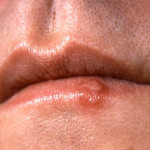 If there’s one type of infection that makes people a bit agitated when you tell them they could have it, it’s herpesvirus (herpes for short). But the thing is… herpes is so common! In fact, there are eight (yes 8!) types of herpes viruses that infect humans and most people are infected with at least one type. I’ll mention 4 of the 8 types below.
If there’s one type of infection that makes people a bit agitated when you tell them they could have it, it’s herpesvirus (herpes for short). But the thing is… herpes is so common! In fact, there are eight (yes 8!) types of herpes viruses that infect humans and most people are infected with at least one type. I’ll mention 4 of the 8 types below.One of the common types of herpesviruses is herpes simplex type 1, which is the usual cause of cold sores, or fever blisters. These are blisters that come out on the mouth, usually the borders of the lips but sometimes on the gums. They usually occur during times of stress such as during a cold (respiratory infection) or a stressful period at work, etc.
Then there is herpes simplex type 2, the usual cause of genital herpes, that is, blisters on the genitals which turn into painful ulcerations. This is the one people worry about when you mention the possibility of herpes. The thing is, though, that type 1 herpes simplex can also cause genital herpes, and type 2 herpes simplex can cause oral or mouth herpes.
Believe it of not, the chicken pox virus (also known as varicella-zoster) is also a herpesvirus. The first infection with this virus causes chicken pox, then it may come back later in life as shingles.
Yet another type of herpesvirus is EBV (Epstein-Barr virus), the cause of infectious mononucleosis or “mono” as it is commonly called. This is a condition classically known to occur in colleges, and characterized by a flu-like illness with swollen glands in the neck, sore throat, fever, etc. If infected with EBV as a child, it is usually without symptoms, unlike in adults.
Herpesviruses are for the most part, not deadly. Often, signs of infection will go away even without specific antiviral treatment (although treatment may shorten the duration of illness). However the virus never gets completely eliminated from the body. It stays dormant in the roots of the nerves. When the immune system (the “police” that keep germs quiet) becomes weakened, then the virus rears its ugly head and comes back. Something as simple as a cold or fever can weaken the immune system and cause an outbreak of oral herpes, for example. This is where the terms “cold sore” and “fever blisters” came from.
More severe infections tend to occur in persons with severely weakened immune systems, such as persons with cancer getting chemotherapy, organ transplant patients, or AIDS patients. A severe form of herpes infection is when it goes to the brain causing meningitis (infection of the lining of the brain) and/or encephalitis (infection of the brain tissues). In these cases, strong antiviral medication is given. I will go into more detail on herpes brain infection in a future post.
The main way to avoid flares of herpes infection is to try to control stress, and to optimize health in general, including controlling conditions like diabetes, which can weaken immune system. Sometimes avoidance is not possible and there is antiviral treatment for severe herpes and shingles outbreaks. Additionally, low doses of antivirals can be given daily to prevent recurrences in people who have them frequently.
Regarding prevention, there is actually a very effective vaccine for chicken pox. There is also a vaccine for shingles. However, the effectiveness of the shingles vaccine varies, declining with increasing age.
In the next post, I will talk more about shingles and it’s vaccine. Make sure you check back to see what I recommend to patients who ask me if they should take that vaccine.
Leave a Reply